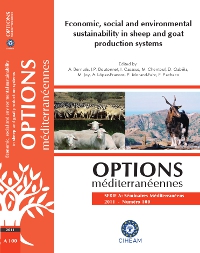| Article précédent | p. 365-373 |
Generational transfer and social sustainability in the dairy sheep farms of the Basque country
Generational transfer in family farms is a vital factor for the social sustainability of livestock production systems. This sustainability is threatened, not because globalization will eventually put an end to small-scale agriculture, as predicted by certain authors, but simply because many younger members of farming families no longer decide to take up farming. The aim of this paper is to present and to explain, from a sociological perspective, the reasons and the social processes that drive young people either to abandon livestock farming or to remain in the sector. To that end, the context of dairy sheep farming is examined in the Basque Country and the decisions taken by the younger members of farming families with first-hand experience of the problems surrounding succession. A qualitative approach is chosen in which 24 in-depth interviews were conducted with the younger members of farming families. The results show, first of all, the existence of a complex set of factors and discourses framed in the context of post-modern agrarian society. Furthermore, our analysis reveals the presence of four different profiles and social discourses among the younger members of farming families facing the problem of succession.
Le remplacement des générations dans l'agriculture familiale est un élément essentiel pour la viabilité sociale des systèmes de production animale. Le but de cet article est de présenter et d'expliquer, à partir d'un point de vue sociologique, les raisons et les processus sociaux impliqués dans la décision soit d''abandon de l'élevage familial soit de permanence dans cette activité. Pour ce faire, nous nous concentrons sur le contexte de l'élevage de brebis laitières de la Communauté Autonome Basque et la décision des enfants d'éleveurs vivant à la première personne la relève agricole de la famille. Nous avons choisi une approche qualitative en menant 24 entretiens en profondeur pour les descendants des éleveurs. Les résultats montrent, en premier lieu, l'existence d'une complexité des facteurs et des discours qui s'inscrivent dans le contexte nouveau de la société agraire post-moderne. D'autre part, notre analyse révèle la présence de quatre profils différents et discours sociaux des enfants d'agriculteurs dans la succession à la ferme familiale.
- [ Afficher ]
- [ Télécharger ]
- [ Exporter la citation ]
Vous pouvez télécharger la citation au format :
- [ Imprimer ]
-
Mots-clés
ANIMAL LAITIER, BREBIS, ESPAGNE, EXPLOITATION AGRICOLE FAMILIALE, PRISE DE DECISION, TRANSFERT D'EXPLOITATION AGRICOLECiter cet article
Ramos Truchero G. Generational transfer and social sustainability in the dairy sheep farms of the Basque country. In : Bernués A. (ed.), Boutonnet J.P. (ed.), Casasús I. (ed.), Chentouf M. (ed.), Gabiña D. (ed.), Joy M. (ed.), López-Francos A. (ed.), Morand-Fehr P. (ed.), Pacheco F. (ed.). Economic, social and environmental sustainability in sheep and goat production systems. Zaragoza : CIHEAM / FAO / CITA-DGA, 2011. p. 365-373. (Options Méditerranéennes : Série A. Séminaires Méditerranéens; n. 100). 7. Proceedings of the International Seminar of the Sub-Network on Production Systems of the FAO-CIHEAM Inter-Regional Cooperative Research and Development Network on Sheep and Goats, 2010/11/10-12, Zaragoza (Spain). http://om.ciheam.org/om/pdf/a100/00801529.pdf



